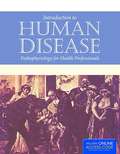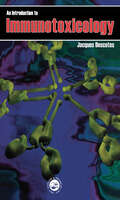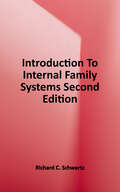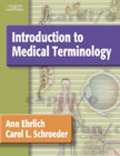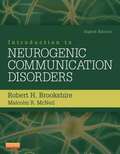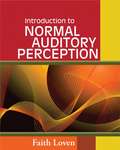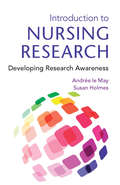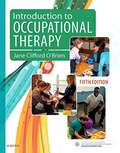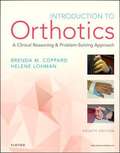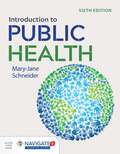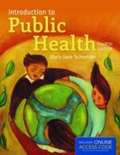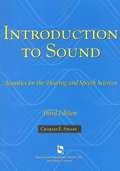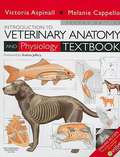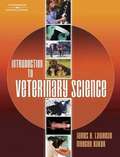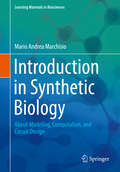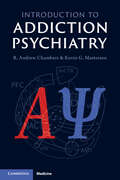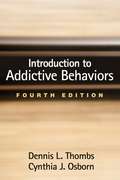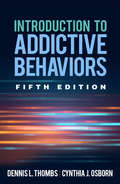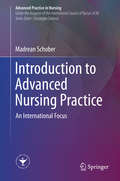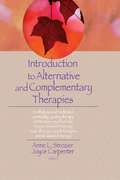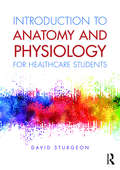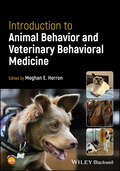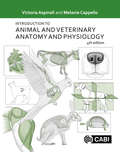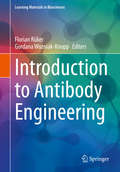- Table View
- List View
Introduction To Human Disease: Pathophysiology For Health Professionals, 6th Edition
by Agnes G. Loeffler Michael N. HartIntroduction to Human Disease: Pathophysiology for Health Professionals, Sixth Edition provides a broad overview of the most common and important human diseases for students pursuing careers in the health professions. Comprehensive yet accessible, it addresses the aspects of disease epidemiology, diagnosis, and treatment that are essential to clinical practice. The Sixth Edition of this popular text has been thoroughly updated to cover the latest advances in medical knowledge and practice, especially with regard to mental health and nutritional disorders. It also includes additional clinical information on treatments for diseases. Designed to facilitate learning, this essential reference features new full-color photos and illustrations, learning objectives, and practice questions for review and assessment. Introduction to Human Disease: Pathophysiology for Health Professions, Sixth Edition will help students gain a solid foundation in disease pathology and medical terminology to help them throughout their medical education. KEY FEATURES* Provides a comprehensive introduction to the essential aspects of human disease* Covers the most common and important human diseases, including mental illnesses* Facilitates learning with chapter objectives, key terms, and practice questions * Includes more than 400 full-color illustrations, photos, and tablesNEW TO THE SIXTH EDITION* New photos and illustrations* New and updated resources for instructors and students* Updated content reflects the current state of medical knowledge and practice* More clinical information, including general and specific treatments for diseases with an emphasize on common laboratory tests* Chapter 26: Infectious Diseases and Chapter 27: Immunologic Diseases are revised and now included in Section 4: Multiple Organ System Diseases* Chapters 24: Mental Illness and 30: Nutritional Disorders are revised, to bring them up-to-date with current health problems (e. g. obesity), concepts, and terminologies
Introduction To Immunotoxicology
by Jacques DescotesThis text provides a concise and comprehensive introduction to key immunotoxicological issues for all those interested in, but with no prior knowledge of, this area of toxicology. The first section explores the health consequences of immunotoxicity, namely the adverse effects related to chemically-induced immunosuppression and immunostimulation, hy
Introduction To Internal Family Systems
by Richard C. SchwartzA highly accessible introduction to a therapeutic approach that brings our inner “parts” into harmony and allows our core Self to lead We’re all familiar with self-talk, self-doubt, and self-judgment―yet most of us still view ourselves as if we have one uniform mind. Dr. Richard Schwartz’s breakthrough was recognizing that we each contain an “internal family” of distinct parts―and that treating these parts with curiosity, respect, and empathy vastly expands our capacity to heal. Over the past two decades, Internal Family Systems (IFS) has transformed the practice of psychotherapy. With Introduction to Internal Family Systems, the creator of IFS presents the ideal layperson’s guide for understanding this empowering, effective, and non-pathologizing approach to self-discovery and healing. Here, Dr. Schwartz shares evidence, case studies, and self-care tools to help you: - Shift from the limiting “mono-mind” paradigm into an appreciation of your marvelous, multidimensional nature - Unburden your wounded parts from extreme beliefs, emotions, and addictions - Demystify the most commonly misunderstood parts―the Exiles, Managers, and Firefighters - Transform your most challenging parts from inner obstacles to invaluable allies - Embrace the existence of innate human goodness―in yourself and others - Connect with the true Self that is greater than the sum of your parts “The most wonderful discovery I have made is that as you do this work, you release, or liberate, what I call your Self or your True Self―the calm, compassionate essence of who you are,” says Dr. Schwartz. “When the Self becomes the leading intelligence in our lives, we create more harmony―both within ourselves and in our external lives.” For therapists, their clients, and anyone interested in understanding and healing themselves, here is an essential guide to a revolutionary approach to self-realization, mental wellness, and transformation.
Introduction To Medical Terminology
by Ann Ehrlich Carol L. Schroeder Ann Roe-HaferThis undergraduate textbook describes the structure and function of the 12 systems that make up the human body, defines each system's pathology, and overviews the primary diagnostic and treatment procedures performed. Color illustrations are provided. The CD- ROM contains exercises and games. Annotation (c)2003 Book News, Inc. , Portland, OR (booknews. com)
Introduction To Neurogenic Communication Disorders
by Robert H. Brookshire Malcolm R. McNeilGet the tools you need to evaluate, diagnose, and treat patients with neurogenic communication disorders! Introduction to Neurogenic Communication Disorders, 8th Edition provides a solid foundation in the neurology of communication, as well as the causes, symptoms, diagnosis, assessment, and management of commonly encountered neurogenic communication disorders in adults. A concise, evidence-based approach shows how to measure and treat abnormalities such as aphasia, dysarthria, right-hemisphere syndrome, and traumatic brain injury syndrome. <P><P>This edition is updated with new coverage of laboratory tests, blast-related injuries to the head, and medications for dementia. Created by neurogenic communication disorders educator Robert H. Brookshire and continued by Malcolm R. McNeil, this bestselling text will enhance your skills in the rehabilitation of clients with neurogenic communication disorders.
Introduction To Normal Auditory Perception
by Faith LovenTaking a classical approach to psychoacoutstics, Introduction to Normal Auditory Perception guides students toward a basic understanding of hearing science and theory. The book explores the germinal research published in the field of auditory perception and then clearly interprets the findings which have formed the foundations of modern auditory theory. Complex theories are broken down for easy comprehension. Starting with the basic principles of acoustics, the text moves through seminal experiments in psychoacoustics regarding the role of stimulus intensity, frequency, and duration on fundamental auditory perceptions. Basic principles of binaural listening are also covered.
Introduction To Nursing Research: Developing Research Awareness
by Susan Holmes Andree le MayIn an engaging and accessible introduction for student nurses, Introduction to Nursing Research: Developing Research Awareness explains the hows and whys of nursing research, stressing its influence on policy and improving patient care. The book delivers a comprehensive guide to the research process and addresses questions such as: What is research
Introduction To Occupational Therapy
by Jane Clifford O'BrienPrepare for success in OT practice with a complete overview of the profession! Introduction to Occupational Therapy, 5th Edition helps you master the roles and responsibilities of the OT practitioner. Content promotes evidence-based OT practice, from client evaluation to planning interventions and goals to reaching optimal outcomes. You’ll also learn valuable skills in clinical reasoning and in providing occupational therapy across the client’s entire lifespan. Written by experienced educator and author Jane Clifford O’Brien, this comprehensive resource discusses today’s OT treatment settings and adds a new chapter on cultural competence.
Introduction To Orthotics: A Clinical Reasoning And Problem-solving Approach (Fourth Edition)
by Brenda M. Coppard Helene LohmanCovering the theory, design, and fabrication of orthotic devices, Introduction to Orthotics: A Clinical Reasoning & Problem-Solving Approach, 4th Edition helps you master the skills you need to choose and fit effective orthoses for patients with hand injuries and functional deficits. It emphasizes upper extremity splinting, with additional coverage of lower extremity orthotics and upper extremity prosthetics, and offers case studies promoting clinical reasoning and problem solving. This edition includes new chapters on orthotics of the shoulder and orthotic systems, plus online videos demonstrating fabrication and fitting techniques. Written by occupational therapy educators Brenda Coppard and Helene Lohman, this textbook/workbook is ideal for students and as a practical resource for occupational therapists and therapy assistants in the clinical setting.
Introduction To Public Health
by Mary-Jane SchneiderIncludes newly updated bonus e-chapter on Learning from the COVID-19 Pandemic. Offering a thorough, accessible and lively overview of public heath for students new to the field, Introduction to Public Health offers a broad-reaching, practical framework for understanding the forces and organizations of public health today. Through engaging, nontechnical language, illustrative real world examples, and the current political, economic, and cultural news of the day, students gain a clear understanding of the scope of today's public health problems and possible solutions.
Introduction To Public Health 4th Edition
by Mary-Jane SchneiderIntroduction to Public Health, Fourth Edition offers a thorough, accessible overview of the expanding field of public health for students new to its concepts and actors. Written in engaging, nontechnical language, this best-selling text explains in clear terms the multi-disciplinary strategies and methods used for measuring, assessing, and promoting public health. Packed with illustrative real-world examples, this updated edition provides students with informative discussions of the current technical issues and practical obstacles facing public health practitioners and policymakers alike. Through coverage of new approaches to research and data collection, current best practices in the field, and the social and ethical challenges of devising public policy, Introduction to Public Health, Fourth Edition provides readers with a broad-reaching, practical framework for understanding the multifaceted forces and organizations of today's public health enterprise.
Introduction To Sound: Acoustics For The Hearing And Speech Sciences (Singular Textbook Series)
by Charles E. SpeaksThis book constitutes the thoroughly refereed post-conference proceedings of the 7th International Conference on Global Security, Safety, and Sustainability (ICDS3), and of the 4th e-Democracy Joint Conferences (e-Democracy 2011) which were held in Thessaloniki in August 2011. <P><P>The 37 revised full papers presented were carefully selected from numerous submissions. Conference papers promote research and development activities of innovative applications and methodologies and applied technologies.
Introduction To Veterinary Anatomy And Physiology Textbook
by Victoria Aspinall Melanie CappelloA sound knowledge of anatomy and physiology is an essential basis for the effective clinical treatment of companion animals. The new Introduction to Veterinary Anatomy and Physiology Textbook builds on the success of the first edition in its thorough coverage of the common companion animal species. Updated throughout, the new edition features online learning resources, providing students with the opportunity to test their knowledge with questions and visual exercises, while instructors can download questions, figures and exercises to use as teaching aids. An essential first purchase for all those embarking upon a veterinary career Now with on-line resources including self-assessment tools and teaching aids Comprehensive coverage of all major companion animal species New equine chapter 'Applied Anatomy' tips relate theory to clinical practice, showing the relationship between anatomy and physiology and the disease process
Introduction To Veterinary Science
by MeeCee Baker James LawheadAn author team combining the technical experiences of a veterinarian working in clinical practice and a 20-year veteran teacher who knows what works in material delivery created this accurate, easy-to-use text, unlike any other of its kind. Starting with an overview of career opportunities available in the veterinary science, the chapters detail topics on cells, tissues, systems, nutrition, species comparison, principles of disease, disease prevention and diagnosis, zoonotic disease, surgery, and economic decision-making in veterinary practice. Each chapter features "A Day in the Life of a Veterinarian" vignette that relays James Herriot-type stories with relevance to clinical practice, and makes the text interesting and informative to students. Accompanying the text are numerous ancillary materials. Detailed lesson plans are available, and a master materials list will allow instructors to refer to one source when ordering annual supplies, with both of these elements saving valuable instruction time. A coordinating lab manual and end-of-chapter activities allow students to put technical know-how to practice, as labs and activities have all been piloted in classrooms. A test bank supplements end-of-chapter questions and tests, and these tests are available on disk and hard copy so instructors can create exams, or use the copy ready variety. This introductory text is geared toward high school and junior colleges, yet appropriate for any entry-level veterinary science course.
Introduction in Synthetic Biology: About Modeling, Computation, And Circuit Design (Learning Materials in Biosciences)
by Mario Andrea MarchisioThe textbook is based on the lectures of the course “Synthetic Biology” for Master’s students in biology and biotechnology at the Harbin Institute of Technology. The goal of the textbook is to explain how to make mathematical models of synthetic gene circuits that will, later on, drive the circuit implementation in the lab. Concepts such as kinetics, circuit dynamics and equilibria, stochastic and deterministic simulations, parameter analysis and optimization are presented. At the end of the textbook, a chapter contains a description of structural motifs (e.g. positive and negative feedback loops, Boolean gates) that carry out specific functions and can be combined into larger networks. Moreover, several chapters show how to build up (an analyse, where possible) models for synthetic gene circuits with four different open-source software i.e. COPASI, XPPAUT, BioNetGeN, and Parts & Pools-ProMoT.
Introduction to Addiction Psychiatry
by R. Andrew Chambers Kevin G. MastersonThis essential, concept-oriented book provides a highly integrative and translational approach to addiction, offering a deep understanding of the condition and its close biological-causal-developmental linkage with mental illness. The book explains addiction around five fundamental components that define disease: 1) Population Impact; 2) Symptom Sets; 3) Disorder of Anatomical Structure and Function; 4) Biological Risk Amplification; and 5) Diagnosis and Treatment. Key evidence and concepts from basic neuroscience are translated to epidemiological, clinical-observational, and treatment levels. The book discusses the broad reach and potent clinical capabilities of addiction psychiatry teams using integrative diagnostics and multi-dimensional treatment plans for patients across the entire addiction-mental illness spectrum. It introduces science-based psychotherapies, therapeutic experiences, medication and neurostimulatory treatments used by addiction psychiatrists in different settings to advance patients through all stages of recovery. An illustrated foundation for advanced undergraduates, physicians, allied clinicians, and scientists entering brain-behavioural health fields.
Introduction to Addictive Behaviors (4th Edition)
by Dennis L. Thombs Cynthia J. OsbornThis widely adopted text introduces students and practitioners to major contemporary models of addiction. Assuming no prior knowledge in the field, the book shows how theory and research can offer a roadmap for effective intervention. It presents multiple perspectives on the causes and mechanisms of substance use problems, reviews their strengths and limitations, and examines their implications for helping people change their behavior. Evidence-based treatment and prevention strategies are described.Pedagogical Features Include:*Accessible style and clear organization.*Concise end-of-chapter summaries.*Review questions in every chapter.New to This Edition*The latest research on prevention and treatment, including current data and revised discussions of genetic influences, family treatment models, and many other topics.*Updated for DSM-5.*Chapter on behavioral addictions.*Chapter on promoting motivation and autonomy.*Chapter on evidence-based practice.
Introduction to Addictive Behaviors, Fifth Edition
by Dennis L. Thombs Cynthia J. OsbornNow revised and updated, this widely used text comprehensively reviews theories of addiction to give students and professionals a multidisciplinary foundation for clinical practice. It explores the causes and mechanisms of substance and behavioral addictions, as well as implications for helping people recover. Providing a science-based perspective, the text emphasizes the importance of using treatment and prevention strategies that are grounded in evidence. Thoroughly updated chapters address disease models; public health approaches; understanding and treating comorbidity; psychoanalytic, behavioral, cognitive, and family systems models; sociocultural approaches; behavioral addiction; and motivational models. Student-friendly features include end-of-chapter summaries and review questions. New to This Edition *Updated throughout with current research and clinical advances. *Discussions of cutting-edge topics: genetics of addiction, addiction stigma, and the opioid epidemic. *New and revised clinical vignettes and review questions.
Introduction to Advanced Nursing Practice
by Madrean SchoberPrepared under the auspices of the International Council of Nurses (ICN), this first volume provides a comprehensive overview of the rapidly emerging field of advanced nursing practice. It addresses central issues in the role and practice development that are fundamental to defining and differentiating the nature of this field. Topics include defining the role, role characteristics, scope of practice, education, regulation and research. Obstacles to and facilitators of that role are addressed and include ethical questions arising in the context of practice development. With an international focus, this volume examines international developments in the field, as reflected in country-specific case studies and examples. It offers a valuable resource for advanced practice nurses, educators and administrators at healthcare institutions.
Introduction to Advanced Nursing Practice: An International Focus (Advanced Practice in Nursing)
by Madrean SchoberPrepared under the auspices of the International Council of Nurses (ICN), this first volume provides a comprehensive overview of the rapidly emerging field of advanced nursing practice. It addresses central issues in the role and practice development that are fundamental to defining and differentiating the nature of this field. Topics include defining the role, role characteristics, scope of practice, education, regulation and research. Obstacles to and facilitators of that role are addressed and include ethical questions arising in the context of practice development. With an international focus, this volume examines international developments in the field, as reflected in country-specific case studies and examples. It offers a valuable resource for advanced practice nurses, educators and administrators at healthcare institutions.
Introduction to Alternative and Complementary Therapies
by Terry S Trepper Anne Strozier Joyce E Carpenter Lorna L HeckerDiscover creative new ways to facilitate the therapeutic process Therapeutic modalities that psychotherapists usually rely on--such as psychodynamic, humanistic, systems, cognitive, narrative, analytic and solution focused--are all verbal interventions. Introduction to Complementary and Alternative Therapies presents a comprehensive overview of complementary and alternative therapeutic interventions that go beyond the standard verbal approaches. The therapies presented in this book--including mindfulness and meditation, spirituality, poetry therapy, art therapy, psychodrama, dance/movement therapy, music therapy, animal-assisted therapy, and touch therapy--provide the reader with creative non-traditional modalities that are effective in conjunction with traditional treatment, or as substitutes. They may enrich talk-therapy, especially when therapists and/or clients get "stuck," or they may provide healing on their own. Introduction to Complementary and Alternative Therapies explains the basics about how these nontraditional therapies work and provides vivid examples for utilizing them in treatment. Each chapter is written by an expert in the field of expertise, and includes a description of the approach, research evidence about its effectiveness, guidelines on how to use the therapy in practice, and case examples. This excellent volume also provides practitioners with a wide range of resources, including Web sites, information on state and national organizations, accrediting board info, and more. Topics in Introduction to Complementary and Alternative Therapies include: the mind-body relationship ways to integrate spirituality in counseling the healing components of poetry research studies on art therapy different techniques available in Psychodrama using body movement as a means of expressing conflicts and desires how music therapy promotes positive changes in the client the healing aspects of animals and much more! Introduction to Complementary and Alternative Therapies is a horizon-expanding guide for therapists, social workers, psychologists, counselors, physicians, educators, and students.
Introduction to Anatomy and Physiology for Healthcare Students
by David SturgeonThis book provides a highly accessible introduction to anatomy and physiology. Written for students studying the subject for the first time, it covers the human body from the atomic and cellular levels through to all the major systems and includes chapters on blood, immunity and homeostasis. Logically presented, the chapters build on each other and are designed to develop the reader’s knowledge and understanding of the human body. By the end of each chapter, the reader will understand and be able to explain how the structures and systems described are organised and contribute to the maintenance of health. Describing how illness and disease undermine the body’s ability to maintain homeostasis, this text helps readers to predict and account for the consequences when this occurs. Complete with self-test questions, full colour illustrations and a comprehensive glossary, this book is an essential read for all nursing and healthcare students in both further and higher education.
Introduction to Animal Behavior and Veterinary Behavioral Medicine
by Meghan E. HerronIntroduction to Animal Behavior and Veterinary Behavioral Medicine Understand and apply key concepts of animal behavior in veterinary practice Animal behavior is a critical aspect of veterinary medicine, often underappreciated despite its pervasiveness throughout the field. Understanding animal behavior can facilitate communication with patients, refine diagnoses and indications of ill health, and aid in processes of learning and socialization. Introduction to Animal Behavior and Veterinary Behavioral Medicine offers a comprehensive overview of the key concepts underlying the behavior of multiple animal species before demonstrating how to apply these concepts clinically. The result is an indispensable resource for veterinary students and practitioners who want to deepen their understanding of patient needs. Introduction to Animal Behavior and Veterinary Behavioral Medicine readers will also find: Comprehensive coverage of companion animal behavior and additional coverage of livestock and wild animal behavior Detailed discussion of topics including social development, animal learning, and applied behavior analysis In depth review of diagnosis and treatment strategies for common behavior disorders in companion animals, extending to various additional species Companion website with videos, handouts for downloading, and links to pertinent scientific articles and informative websites Introduction to Animal Behavior and Veterinary Behavioral Medicine is ideal preparation for veterinary medical students as part of “day one readiness” in their professional careers, as well as veterinary practitioners looking for a solid foundation in animal behavior and the treatment of key issues.
Introduction to Animal and Veterinary Anatomy and Physiology
by Victoria Aspinall BVSc, MRCVS Melanie Cappello BSc (Hons) ZooloA sound knowledge of anatomy and physiology is an essential basis for the effective clinical treatment of companion animals and farm animals alike. The fourth edition of this bestselling book continues to provide a comprehensive description of the anatomy and physiology of dogs and cats. The book builds on these foundations with detailed descriptions of exotic small species including birds, and domestic farm animals, including cows, sheep and pigs, as well as the horse. The text: Contains detailed descriptions of the systematic anatomy and physiology of a wide range of animal species. Covers clinical conditions and disease examples related to the individual body systems. Includes applied anatomy tips that relate theory to clinical practice. Is written by expert authors with a wealth of veterinary, animal science and teaching experience. Includes more clinical application examples and question and answer tests to reinforce student learning. Has been updated with more information for animal science students. This text provides an essential basis for all those embarking upon a veterinary, animal science or animal management career.
Introduction to Antibody Engineering (Learning Materials in Biosciences)
by Florian Rüker Gordana Wozniak-KnoppThis highly readable textbook serves as a concise and engaging primer to the emerging field of antibody engineering and its various applications. It introduces readers to the basic science and molecular structure of antibodies, and explores how to characterize and engineer them. Readers will find an overview of the latest methods in antibody identification, improvement and biochemical engineering. Furthermore, alternative antibody formats and bispecific antibodies are discussed.The book’s content is based on lectures for the specializations “Protein Engineering” and “Medical Biotechnology” within the Master’s curriculum in “Biotechnology.” The lectures have been held at the University of Natural Resources and Life Sciences, Vienna, in cooperation with the Medical University of Vienna, since 2012 and are continuously adapted to reflect the latest developments in the field. The book addresses Master- and PhD students in biotechnology, molecular biology and immunology, and all those who are interested in antibody engineering.
